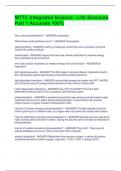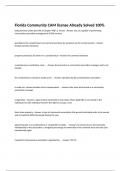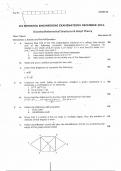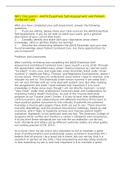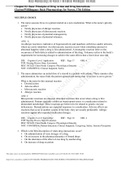Globalisation: the process by which people, their culture, goods,
capital can be transferred between countries with little or no barrier.
As a result, the world is becoming increasingly interconnected and
interdependent as a result of trade and cultural exchange.
Connections between countries are:
- Lengthening – becoming connected to countries that are further away
- Deepening – are connected in more ways than we used to be. Difcult to escape
concepts or ideas or items that aren’t from somewhere else in the world.
Factors accelerating globalisation:
CHEAPER AND FASTER TRANSPORT:
- Can ship goods much faster and for cheaper. Has led to JUST IN TIME producton
rather than JUST IN CASE producton.
-> Also due to containerisatonnstandardisaton of container boxes as a global standard
for mechanisms of trade and transport of items from one country to the next.
e.g. EasyJet – cheap budget fying for business and leisure customers on short-haul fights
[90s]. Reduced prices so more people would fy – was successful, and drove globalisaton as
cheap prices made it accessible to everyone and made internatonal travel more common.
->Has led to the development of a SHRINKING WORLD in which distant places feel closer as a
result of quick transport. Also known as TIME-SPACE COMPRESSION.
TECHNOLOGICAL DEVELOPMENTS:
- Fibre optcs, social media, the internet, has allowed for people across the world to
connect socially and culturally. Free movement of ideas and informaton on internet.
e.g. Developments in African countries – leapfrogging of landlines straight to mobile phones
allows businesses to develop, can call people to deliver goods and communicate between
countries quickly and easily.
e.g. GREEN REVOLUTION – a technological and economical revoluton in which subsistence
agriculture in less developed countries was replaced with commercial agriculture (producton
of cash crops with the intenton of widespread distributon to wholesalers or retail outlets).
Made producton of crops more efcient, especially the mechanisaton of farming jobs. But
caused people to lose their jobs and money went to the elite. Farmers in developing or
emerging economies were lef behind – losers.
- More generally the use of robots and machines has made producton of goods more
efcient and quick, but again has caused people to lose their jobs.
TNCs:
- Create and maintain SPATIAL DIVISION OF LABOUR in which multple sites of
producton are established in less developed countries so they can take advantage of
cheap labour costs and low taxes. In a way, this provides jobs to the local community
and helps them develop their economy – MULTIPLIER EFFECT. This economic
liberalisaton of developing countries (neoliberalism pushed by internatonal
organisatons) allows TNCs to utlise strategies like OUTSOURCING, OFFSHORING, etc.
, - They also infuence global culture, esp. through WESTERNISATION, but ofen through
GLOCALISED means.
INTERNATIONAL ORGANISATIONS/INTERGOVERNMENTAL ORGANISATIONS:
- e.g. IMF, World Bank, WTO – all in favour of NEOLIBERALISM (belief that free market
with no government interventon is best. Believe that wealth will TRICKLE DOWN to
the poor) – AKA all organisatons support countries having a WASHINGTON
CONSENSUS. Promote free trade policies to developing countries e.g. trade blocs with
other countries in which trade between those countries has no TARIFFS or QUOTAS;
privatsaton of businesses; DEREGULATION of businesses in which restrictons on
them are loosened; promote FDI; etc.
NEW MARKETS:
- Globalisaton has made people richer and created a NEW GLOBAL MIDDLE CLASS of
people with more money to purchase things – has widened markets for certain items
e.g. meat and chicken in China.
-> is having negatve environmental impacts
NATIONAL GOVERNMENTS:
- Can either allow country to be SWITCHED ON or SWITCHED OFF to globalisaton and
foreign investment. E.g. The Sahel Region; North Korea.
The role of National Governments:
- Can use strategies to incentvise FDI in their country:
- Offer tx ineenives forr DDe, e.g. Ireland ofered Apple low tax rates od
0.005% so they don’t move elsewhere and contnue to provide jobs to local
community.
- Dree mxrket liberxlisxirnnNerliberxlism, e.g. India began economic
liberalisaton in 1991 by reducing tarifs and interest rates. This allowed for up
to 49% of FDI they received. FDI grew from 100 million US dollars to 2 billion
US dollars in 4 years.
- Privxisxirn, allows foreign companies to invest in privatsed
servicenindustry, e.g. EDF in the UK is owned by Electricite de France
- Enerurxging business stxrt-ups, through many incentves to allow businesses
to gain more profts, e.g. tax incentves. E.g. Sunday Trading introduced 1994 –
atracted foreign businesses like Burger King. Also E.g. Nissan decided to use
Sunderland as a manufacturing point for a car model. Were sold land at cheap
agricultural prices and given £40m extra money. Were then responsible for
producing 27,000 jobs in the area.
- Enerurxging grrwth rfo trxde blres, to trade freely with neighbouring
countries, with no tarifs or quotas. This provides companies with a larger
market and also means they don’t have to pay extra taxes, e.g. when A10
occurred in 2004, Tesco gained access to 75 million extra customers.
- E.g. China’s Open-Door Policy – in 1978 they created SPECIAL ECONOMIC ZONES (SEZs)
n ECONOMIC PROCESSING ZONES that ofered large pools of cheap labour and tax
incentves. Companies ofshored and outsourced producton to these SEZs. In 1995,
GDP per capita was 620 dollars, in 2005 it was 8000.
- Can make country SWITCHED ON or SWITCHED OFF to globalisaton
- e.g. China – switched itself on with open door policy 1978



